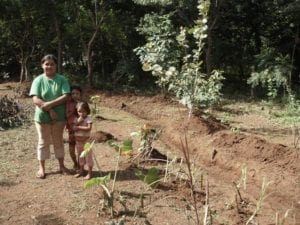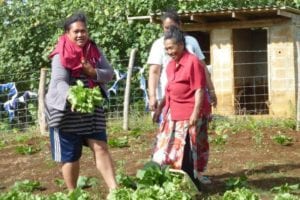Climate Justice
Take Action
End Free Carbon Credits
Subsidising pollution in a climate crisis doesn’t make sense. We are campaigning to end free carbon credits, cut emissions and unlock green jobs in the industry sector.
 Right now, the government subsidises the pollution of industries that contribute 10% of New Zealand’s emissions. These industries receive free carbon credits worth $600 million a year to continue operating as usual.
Right now, the government subsidises the pollution of industries that contribute 10% of New Zealand’s emissions. These industries receive free carbon credits worth $600 million a year to continue operating as usual.- This is fundamentally incompatible with our climate goals. Industries can continue to pollute and receive a subsidy for the privilege beyond 2050. It is unfair that these industries get a free pass while households play their part by paying a carbon price on petrol and electricity bills.
- We want the government to end free carbon credits and provide incentives to decarbonise – like providing access to upfront loans for industry. The government can accelerate emissions reductions and ensure every sector is taking responsibility for its pollution.
CWS is part of the Don’t Subsidise Pollution campaign. Please sign our petition.
The free carbon credits, called industrial allocations under the Emissions Trading Scheme, are given to emissions-intensive industries that account for 10% of New Zealand’s climate pollution. Three-quarters of the free credits go to just four companies: NZ Steel, Methanex, Ballance, and New Zealand Aluminium Smelters. In 2021, these credits were worth $600 million in foregone revenue to the Crown, and their value will increase over time as the carbon price rises.
Ending Free Carbon credits is one way to support global efforts for climate justice.
Our Approach
The climate challenge is one of the biggest we face. Rising temperatures are causing drought, flooding, and more intense weather patterns. It is the poorest people living on the most vulnerable land who are the first to suffer. Traditional growing practices are no longer sustainable. Communities are hit by unprecedented flooding. People are going hungry because crops are failing. Climate change is already undoing work we have done to help people out of poverty in places like Nicaragua and the Philippines. The need for climate justice is urgent.
Our partners are at the forefront of their communities trying to meet its life-threatening consequences. Climate change is adding to the injustices and inequalities they face on a daily basis.
From Our Partners
Pacific Conference of Churches’ Tokatoka Declaration on Climate Change, Disaster Risk Reduction and Resilience – 14-17 September 2016.
Pacific Churches Leaders made an urgent call for more action by governments and institutions to keep the global temperature rise to 1.5 degrees C above the preindustrial level and a rapid phase out of fossil fuels by 2050. They want for immediate action to assist with community-based adaptation and risk management that foster resilience and overcome poverty. They ask for at least US$100 billion annually to assist developing countries and for full consultation with and the participation of affected communities.
In the Philippines, Developers is now planting mangroves to protect coastal communities (pictured above) to provide protection from coastal surges and habitat for the fisheries on which communities depend. In 2013, Typhoon Haiyan damaged or destroyed 94-98% of homes and crops on the northern coast of Aklan province. Haiyan was one of the most devastating storms on record – windspeeds topped 300 km an hour. With assistance from CWS, Developers has coordinated corrugated iron roofing for 3,061 homes, set up a farmer’s market, and the planting of 49,540 trees and root crops. These vulnerable communities are improving first aid skills and making plans for the next disaster. Read our report on their Mangrove planting project.
 In Nicaragua, CEPAD is assisting small farmers survive unpredictable and inadequate rains, disasters and poverty. CEPAD staff train farmers living on 1 to 2 hectares in agro-ecological farming practices. Through 40 local groups, these farmers will receive seeds, plants and livestock as well as training – families will eat better and be able to improve their income. They are establishing community nurseries and micro-dams. Ranked fourth on the list of countries at risk from climate change, Nicaragua needs to help people plan for a warmer climate.
In Nicaragua, CEPAD is assisting small farmers survive unpredictable and inadequate rains, disasters and poverty. CEPAD staff train farmers living on 1 to 2 hectares in agro-ecological farming practices. Through 40 local groups, these farmers will receive seeds, plants and livestock as well as training – families will eat better and be able to improve their income. They are establishing community nurseries and micro-dams. Ranked fourth on the list of countries at risk from climate change, Nicaragua needs to help people plan for a warmer climate.
In South India, Neythal is leading a state wide campaign threatening the homes and livelihoods of tens of thousands of fisherfolk. The government and others used first the 2004 tsunami, then power plants, sand mining, ship breaking businesses, sand mining operations and shrimp farmers to take their traditional resources. On the beach, in the street and through Tamil Nadu’s legal system, Neythal is demanding justice.
In Sri Lanka, Monlar is helping farmers recover after heavy southwest monsoons in May 2017. The group including small farmers determined they would help colleagues in 15 districts affected by landslides and flooding on top of two years of drought. Groups organised equipment and will teach their agro-ecological techniques so families can survive. According to the National Building Research Organisation more than 60% of land in the central hills is prone to landslides, something Monlar wants to fix.
 In Tonga, Ama Takiloa took part in a joint national simulation training so as to better prepare local people in case of an emergency. Its community gardens share skills that will help families adapt to the climate and improve food security. In 2013, Cyclone Ian damaged or destroyed 99% of homes.
In Tonga, Ama Takiloa took part in a joint national simulation training so as to better prepare local people in case of an emergency. Its community gardens share skills that will help families adapt to the climate and improve food security. In 2013, Cyclone Ian damaged or destroyed 99% of homes.


